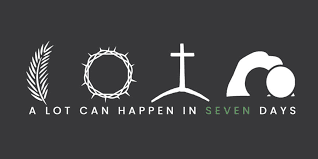Mark 15:33-41
Places of the Passion: Good Friday at Golgotha
We continue our journey through the places of the Passion. Tonight,
we are at Golgotha, the place of the skull. It’s the place where Romans throw
away human bodies after doing the most unimaginable things to them. It’s also
the city dump where the refuse of daily life is left to rot.
Mark says simply, “They crucified him.” Mark had no need to offer any details. His readers would have been fully aware of what that meant, in the same way that we know what it means to hang someone or use the electric chair.
The Romans had crucifixion down to a science. They knew what would
cause the most pain without killing the person too quickly. Usually, it took several
days for people to die on the cross, but Jesus had been badly beaten, so his
body only lasted 6 hours. And perhaps God was merciful.
Jesus had known God’s presence his whole life. Now, on the cross, he
was experiencing separation from God. How emotionally painful this must have
been! Yet, this separation must have been necessary, in order that Jesus’ body could
die but his spirit live on.
It’s important that we pay attention to a detail Mark mentions. The curtain in the temple is torn apart. This curtain divides the Holy of Holies, the most holy space, from the simply holy spaces of the temple. Only the high priest entered this space and only once a year. It was designed to prevent ordinary people from coming into close contact with God. When the temple curtain is torn apart, God makes it known that anyone is welcome in the divine presence.
With Jesus’ death and resurrection, all things are made new. Since
the beginning, people have said that God has power is over all things. Now, we
know that God even has power over death. But first, we must remember the death.
It’s so easy to forget
about the death. Just skip from Palm Sunday to Easter Sunday without the painful
stuff in-between. The demonstration in the temple, the challenges by the
leaders, the long good-bye with the disciples. Not to mention the betrayal, the
arrest, the trial, the abuse and torture.
And the time on the cross. In Lutheran churches, the cross is usually empty, though some have crucifixes, crosses with Jesus’ body present. We brag that the cross is empty, the resurrection has happened, and all is new. But we also need to remember that there once hung a body, Jesus’ body, on the cross.
Jesus – God’s Son – did this for us, so we would know how much God
loves us. Let’s not take that life and death for granted. Let’s recognize what
it cost Jesus to willingly give up his life, for us and our relationship with
God. Let’s give thanks for God’s mercy and share that mercy with all who need
it. Amen







